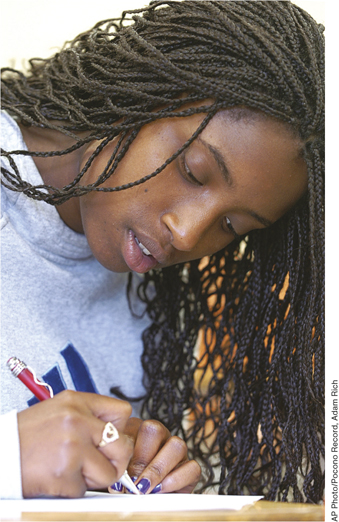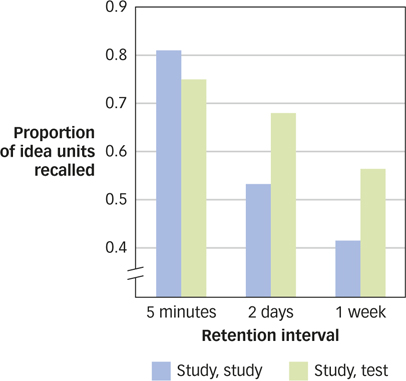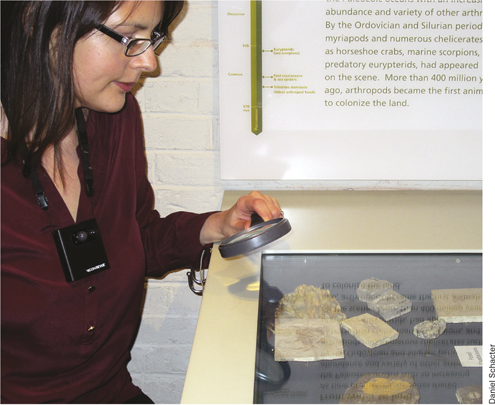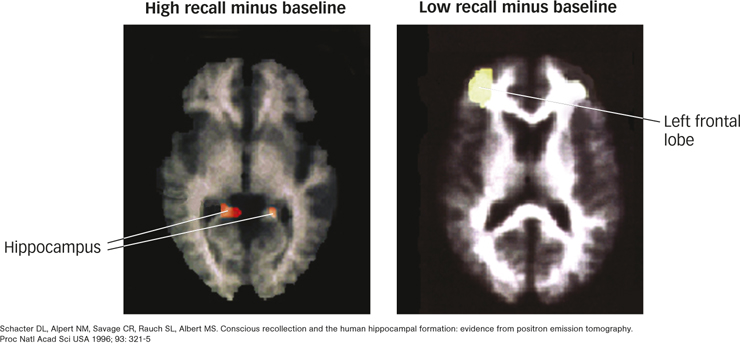6.3 Retrieval: Bringing Memories to Mind
There is something fiendishly frustrating about piggy banks. You can put money in them, you can shake them around to assure yourself that the money is there, but you can’t easily get the money out. If memories were like pennies in a piggy bank, stored but inaccessible, what would be the point of saving them in the first place? Retrieval is the process of bringing to mind information that has been previously encoded and stored, and it is perhaps the most important of all memory processes (Roediger, 2000; Schacter, 2001a).
183
Retrieval Cues: Reinstating the Past

One of the best ways to retrieve information from inside your head is to encounter information outside your head that is somehow connected to it. The information outside your head is called a retrieval cue, external information that is associated with stored information and helps bring it to mind. Retrieval cues can be incredibly effective. How many times have you said something like, “I know who starred in Trouble with the Curve, but I just can’t remember her name?” At such moments, did a friend give you a hint (“Wasn’t she in Julie & Julia?”), which instantly brought the answer to mind (“Amy Adams!”)? Such incidents suggest both that information is sometimes available in memory even when it is momentarily inaccessible and also that retrieval cues help us bring inaccessible information to mind.
Hints are one kind of retrieval cue, but they are not the only kind. The encoding specificity principle states that a retrieval cue can serve as an effective reminder when it helps re-
What is an example of a retrieval cue you have used?
Retrieval cues need not be external contexts—
state-dependent retrieval
The tendency for information to be better recalled when the person is in the same state during encoding and retrieval.
The encoding specificity principle makes some unusual predictions. For example, you learned earlier that making semantic judgments about a word usually produces more durable memory for the word than does making rhyme judgments. So if you were shown a cue card of the word brain and if your friend were asked to think about what brain means while you were asked to think of a word that rhymes with brain, we would expect your friend to remember the word better the next day if we asked you both, “Hey, what was that word you saw yesterday?” However, suppose we asked you both, “What was that word that rhymed with train?” In this case, the retrieval cue would match your encoding context better than your friend’s, and we would expect you to remember it better than your friend did (Fisher & Craik, 1977). The principle of transfer-appropriate processing is the idea that memory is likely to transfer from one situation to another when the encoding and retrieval contexts of the situations match (Morris, Bransford, & Franks, 1977; Roediger, Weldon, & Challis, 1989).
transfer-appropriate processing
The idea that memory is likely to transfer from one situation to another when the encoding and retrieval contexts of the situations match.
Consequences of Retrieval

Human memory differs substantially from computer memory. Simply retrieving a file from my computer doesn’t have any effect on the likelihood that the file will open again in the future. Not so with human memory. Retrieval doesn’t merely provide a readout of what is in memory; it also changes the state of the memory system in important ways.
184
Retrieval Can Improve Subsequent Memory
The simple act of retrieval can strengthen a retrieved memory, making it easier to remember that information later (Bjork, 1975). For example, in one experiment, participants studied brief stories and then either studied them again or were given a test that required retrieving the stories (Roediger & Karpicke, 2006). Participants were then given a final recall test for the stories either 5 minutes, 2 days, or 1 week later. As shown in FIGURE 6.9, at the 5-
Should students spend more time testing themselves on material (retrieval) or studying it over and over?
Retrieval Can Impair Subsequent Memory
As much as retrieval can help memory, that’s not always the case. Retrieval-
How can retrieval-
Retrieval Can Change Subsequent Memory

In addition to improving and impairing subsequent memory, the act of retrieval can also change what we remember from an experience. In a recent experiment, participants went to a museum, where they took tours in which they viewed designated exhibits; each individual tour contained several different stops (St. Jacques & Schacter, 2013). The participants took a tour while wearing a camera that, every 15 seconds, automatically took pictures of what was in front of them. Two days later, participants visited the memory laboratory (in a separate building) for a “reactivation session.” After memories of some of the stops were reactivated by looking at photos of them, participants were asked to rate, on a 1–
185
Participants sometimes incorrectly remembered that the stop shown in a novel photo had been part of the original tour. Most important, participants who tended to make this mistake also tended to have more vivid recollections during the reactivation session. In other words, retrieving and vividly reexperiencing memories of what participants actually did see at the museum led them to incorporate into their memories information that was not part of the original experience. This finding may be related to the phenomenon of reconsolidation that we discussed earlier (p. 180), where reactivating a memory temporarily makes it vulnerable to disruption and change. At the very least, this finding reinforces the idea that retrieving a memory involves far more than a simple readout of information.
Separating the Components of Retrieval
Before leaving the topic of retrieval, let’s look at how the process actually works. There is reason to believe that trying to recall an incident and successfully recalling one are fundamentally different processes that occur in different parts of the brain (Moscovitch, 1994; Schacter, 1996). For example, regions in the left frontal lobe show heightened activity when people try to retrieve information that was presented to them earlier (Oztekin, Curtis, & McElree, 2009; Tulving et al., 1994). This activity may reflect the mental effort of struggling to dredge up the past event (Lepage et al., 2000). However, successfully remembering a past experience tends to be accompanied by activity in the hippocampal region (see FIGURE 6.10; Eldridge et al., 2000; Giovanello, Schnyer, & Verfaellie, 2004; Schacter, Alpert, et al., 1996). Furthermore, successful recall also activates parts of the brain that play a role in processing the sensory features of an experience. For instance, recall of previously heard sounds is accompanied by activity in the auditory cortex (the upper part of the temporal lobe), whereas recall of previously seen pictures is accompanied by activity in the visual cortex (in the occipital lobe; Wheeler, Petersen, & Buckner, 2000). Although retrieval may seem like a single process, brain studies suggest that separately identifiable processes are at work.

How is brain activity different when trying to recall versus successfully recalling?
This sheds some light on the phenomena we just discussed: retrieval-
186
SUMMARY QUIZ [6.3]
Question 6.7
| 1. | The increased likelihood of recalling a sad memory when you are in a sad mood is an illustration of |
- the encoding specificity principle.
- state-
dependent retrieval. - transfer-
appropriate processing. - memory accessibility.
b.
Question 6.8
| 2. | Which of the following statements regarding the consequences of memory retrieval is false? |
- Retrieval-
induced forgetting can affect eyewitness memory. - The act of retrieval can strengthen a retrieved memory.
- Retrieval can impair subsequent memory.
- Retrieval boosts subsequent memory through the repetition of information.
d.
Question 6.9
| 3. | Neuroimaging studies suggest that trying to remember activates the |
- left frontal lobe.
- hippocampal region.
- occipital lobe.
- upper temporal lobe.
a.